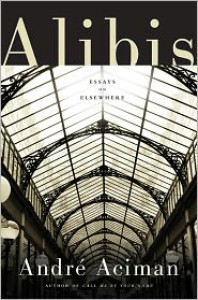Alibis: Essays on Elsewhere

Great books, like great cities, always let us find things we think are only in us and couldn’t possibly belong elsewhere but that turn out to be broadcast everywhere we look, Great artists are those who give us what we think was already ours. (p. 34)
Sometimes, it’s nice to sit down and read a book that feels like you’re being talked to. I don’t mean the kind that makes you feel like you’re indirectly having a conversation with the author on the topic he’s writing about, rather more like an engaging lecture that you simply want to sit and listen to. This is very much what “Alibi” is like. It isn’t a collection that’s interested, I would say, in making the reader feel welcome or engaged with what its talking about – quite the opposite. Instead, it’s rather like listening to a prof who’s lecturing on a topic they’re very passionate about, a topic you might be interested in yourself or simply wouldn’t mind finding out more about, and so you sit there are enjoy the storytelling moment of the event, occasionally picking up bits that resonate with you or that strike you as something that relates to your own experiences.
Aciman has a clear understanding of the direction in which his essays are going, and an excellent grasp of the language he uses to get him there. Unsurprisingly, some essays were more interesting than others – the opening “Lavender” was particularly strong, same with the epilogue “Parallax”, although the latter got a bit wordy in a couple places that were similar to moments when someone gets so engaged and lost in their own discussion that they forget they have an audience who might have trouble following along. I personally also preferred the more historical essays, or bits of essays, in this collection, simply because that is what I like reading frequently – I love the close proximity between the author’s personal experience and historical, textbook-like facts next to each other in one narrative. That is what I hoped to get when I picked up this book, and that is certainly what I received. There wasn’t a single essay that I disliked, merely some that I found simply good without any other thoughts or reactions attached to them.
If you don’t like feeling like you’re potentially being talked-down to or lectured at, then perhaps this isn’t the right book for you. Aciman presents his thoughts and experiences quite clearly, and doesn’t make any open and direct invitation for the reader to say “I can relate to that” – such a reaction will come naturally to either a curious reader or a lucky one, depending on which side of the fence you fall on. The collection is certainly interesting well-written, and there’s no mistaking that the author is knowledgeable and well-spoken. The decision to read or dismiss this book, in the end, is just a matter of personal taste.
 1
1





